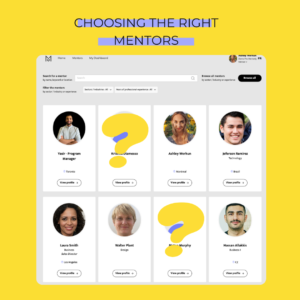In today’s corporate landscape, mentorship programs have become indispensable tools for nurturing talent, fostering growth, and enhancing employee satisfaction. A well-structured mentorship program not only benefits mentees but also contributes significantly to the development and retention of valuable talent within a company. However, one critical aspect that determines the success of such programs is the selection of suitable mentors.
Identifying individuals who possess the requisite skills, experience, and willingness to guide others can be challenging, particularly in large organizations where hierarchies are complex, and employees come from diverse backgrounds. Should mentor selection primarily be based on hierarchical levels and seniority, or should it prioritize soft skills and personal interests? Let’s explore both perspectives to understand how to assess who would be a good mentor in a mentor program in a large company.
1. Level and Seniority:
Traditionally, mentorship programs have often aligned mentors with mentees based on hierarchical levels and seniority within the organization. This approach offers certain advantages:
- Expertise and Experience: Senior employees typically possess extensive industry knowledge and experience, which can be invaluable for junior staff seeking guidance.
- Organizational Insight: Higher-level employees often have a broader understanding of the company’s goals, culture, and processes, enabling them to provide mentees with strategic advice and career insights.
- Access to Networks: Senior mentors usually have well-established networks both within and outside the organization, which they can leverage to open doors and create opportunities for their mentees.
However, relying solely on level and seniority for mentor selection may have limitations:
- Limited Availability: Senior employees might have limited bandwidth due to their existing responsibilities, making it challenging to allocate time for mentoring.
- Generation Gap: There may be a significant age or experience gap between mentors and mentees, leading to potential communication barriers and differences in perspectives.
2. Soft Skills and Interest:
An alternative approach focuses on identifying mentors based on their soft skills, personal attributes, and genuine interest in helping others grow:
- Empathy and Communication: Effective mentors possess strong interpersonal skills, including empathy, active listening, and clear communication, enabling them to build trust and rapport with their mentees.
- Coaching and Development Skills: Mentors should demonstrate a genuine interest in nurturing talent and facilitating the growth of others. They should be adept at providing constructive feedback, setting goals, and supporting mentees in achieving them.
- Alignment of Values and Goals: Matching mentors and mentees based on shared interests, values, and career aspirations can foster a more meaningful and productive mentoring relationship.
This approach offers several advantages:
- Enhanced Engagement: Mentors who are genuinely passionate about mentoring are more likely to be actively engaged and committed to supporting their mentees’ development.
- Tailored Support: Mentors who understand their mentees’ individual strengths, weaknesses, and career goals can provide more personalized guidance and support.
- Cross-Generational Learning: By focusing on soft skills and interests rather than hierarchical levels, organizations can facilitate cross-generational learning and collaboration, fostering a culture of continuous growth and innovation.
Finding the Right Balance:
In reality, the most effective mentorship programs often strike a balance between these two approaches. Here’s how organizations can achieve this:
- Structured Matching Process: Implement a structured mentor-mentee matching process that considers both level/seniority and soft skills/interests. This could involve assessments, interviews, or self-selection surveys to identify suitable mentors and mentees.
- Diverse Pool of Mentors: Encourage employees from all levels and departments to participate as mentors, recognizing that valuable mentorship can come from various sources, not just senior leadership.
- Ongoing Support and Training: Provide mentors with the necessary training, resources, and ongoing support to develop their mentoring skills and ensure the success of the program.
- Flexibility and Adaptability: Be open to adjusting mentorship pairings based on feedback, changing circumstances, and evolving needs to maximize the effectiveness of the program.
Selecting the right mentors for a mentorship program in a large company requires a thoughtful and strategic approach that considers both hierarchical levels and seniority, as well as soft skills and personal interests. By finding the right balance and fostering a culture of mentorship and continuous learning, organizations can create impactful mentorship experiences that drive employee development, engagement, and ultimately, business success.
With Mentorly’s intake process tool, you get a peek into the interests and skills of mentors at all levels of your company. Then, our Smart Matching feature helps you find the perfect mentee for them. This boosts the success of the mentorship by making sure the mentor’s strengths match what the mentee wants to learn. Want to know more? Schedule a chat with one of our mentorship experts and see Mentorly in action!

